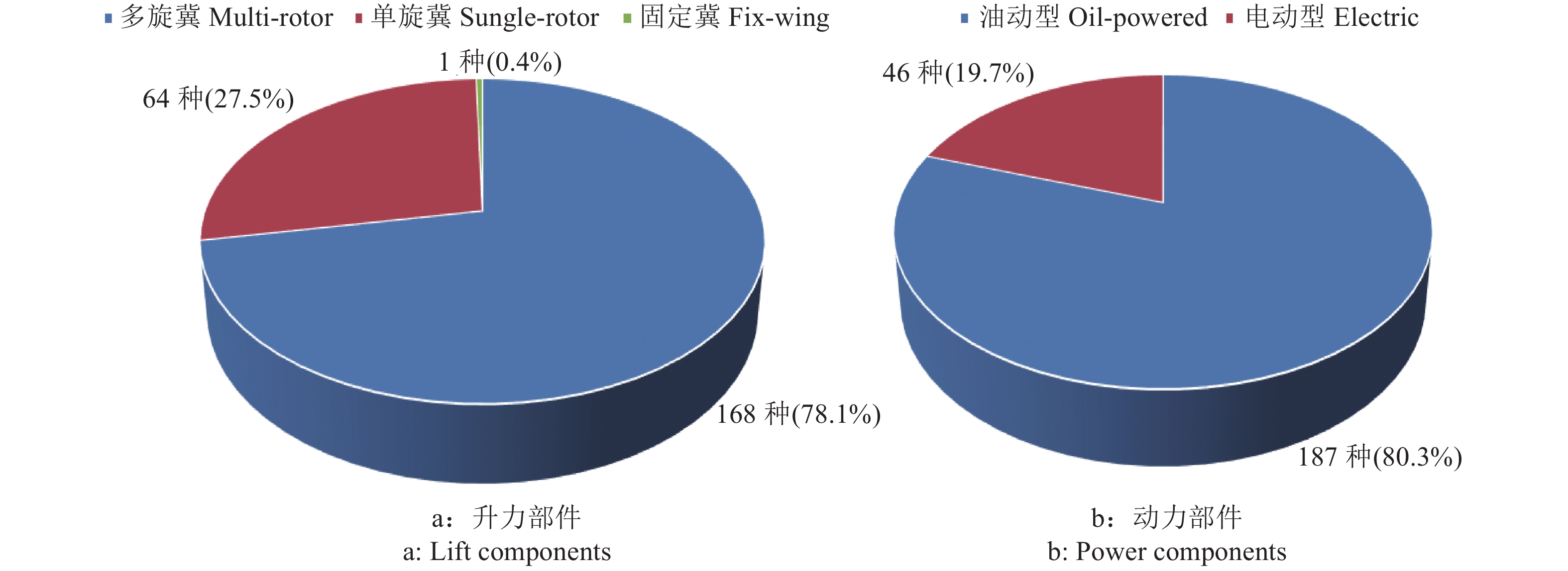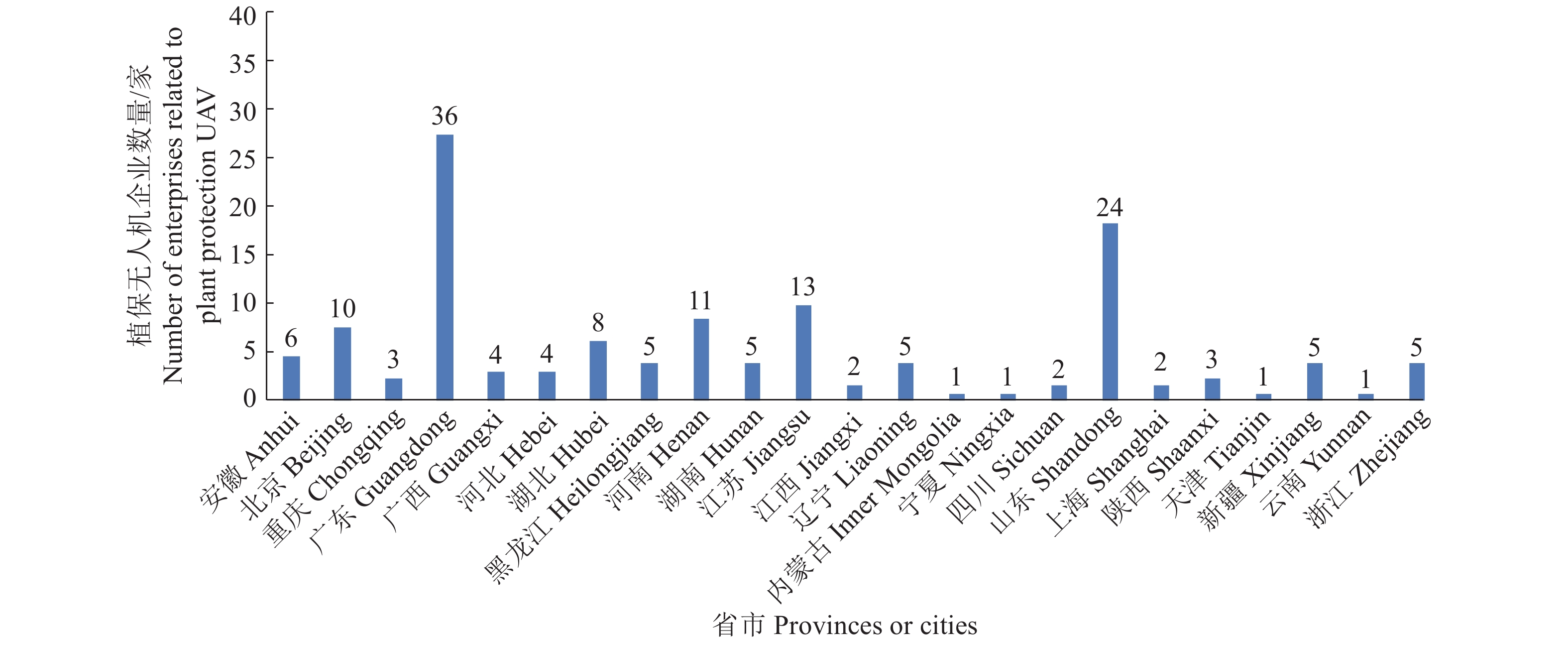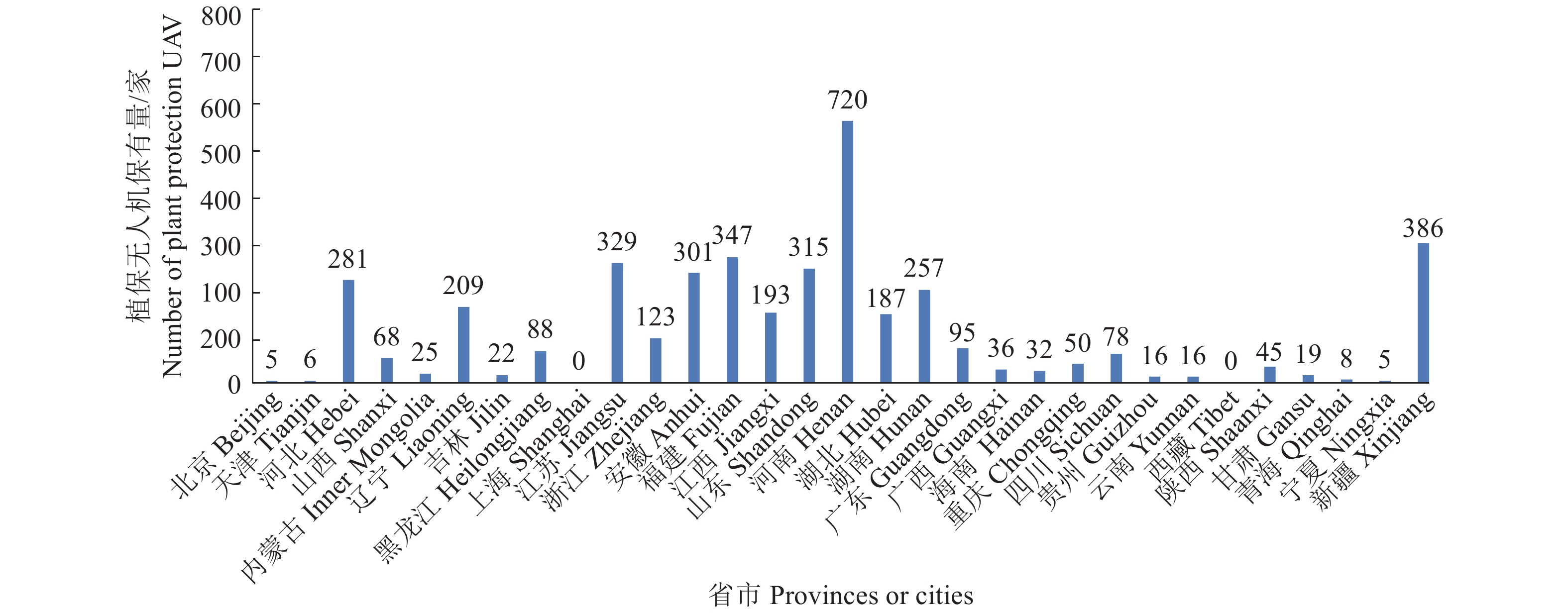Development situation and problem analysis of plant protection unmanned aerial vehicle in China
-
摘要:
植保无人机作为我国农业航空产业的重要组成之一,近年来的迅猛发展和应用引起了人们广泛的关注。为全面、深入地了解中国植保无人机的发展形势及存在的问题,农业农村部农机化司委托华南农业大学国家精准农业航空施药技术国际联合研究中心统计和撰写了“2016年我国农用植保无人飞机发展形势分析与政策建议”的报告。在此报告的基础上,本文对我国植保无人机的类型、生产企业及保有量分布情况进行了统计和分析,比较全面地展示了中国植保无人机行业的发展状况,总结和提出了目前植保无人机行业发展中在关键施药技术研究、相关标准制订以及监督管理这3个方面存在的主要问题及建议,并对植保无人机的市场前景、关键技术和作业服务模式的发展趋势进行了预测,以期为国内科研机构和企业的科学研究及应用提供参考,加快我国植保无人机产业的发展进程,促进和推动我国植保无人机产业的健康快速发展。
Abstract:Plant protection unmanned aerial vehicle (UAV) was an important component in China agricultural aviation industry, its rapid development and application in recent years attracted extensive attention. In order to thoroughly and deeply understand the current development situation and problems of plant protection UAV in China, the Department of Agricultural Mechanization Management of the Ministry of Agriculture and Rural Affairs commissioned National Center for International Collaboration Research on Precision Agricultural Aviation Pesticides Spraying Technology of South China Agricultural University to perform a survey and generate a report of “Analysis of the Development Situation and Policy Suggestion for Agricultural Plant Protection UAV in China in 2016”. Based on this report, this paper performs statistical analyses on the type distribution, enterprises distribution and ownership distribution of plant protection UAV in China. The overall situation of plant protection UAV in China is presented. The main problems and suggestions related to the research of key pesticide spraying technology, the establishment of relevant standard and the management of supervision in the development of plant protection UAV industry are summarized and put forward. And the development trend of market prospect, key technologies and operation service mode of plant protection UAV are forecasted. It is expected to provide references for scientific research and application of domestic scientific research institutions and enterprises, which can promote and encourage the development process of plant protection UAV industry in China.
-
-
表 1 植保无人机电动机型和油动机型的优劣比较
Table 1 Comparisons of advantages and disadvantages between electric and oil-powered plant protection unmanned aerial vehicle (UAV)
机型 Type 优势 Advantage 劣势 Disadvantage 电动植保无人机
Electric plant protection UAV环保,无废气,不造成农田污染;结构简单,轻便灵活,易于操作和维护,普及化程度高,售价低,易于用户接受;电机寿命长 载荷较油动机型小,载荷范围5~15 L;航时短,单架次作业面积小;采用锂电池作为动力源,场外需配置发电机或多块电池; 油动植保无人机
Oil-powered plant protection UAV载荷大,载荷范围可达15~20 L;航时长,单架次作业范围大;下洗风场大,药液穿透性较好;抗风性能较好 不环保,废气和废油易造成农田污染;售价高,个体用户难以接受;结构复杂,整体维护困难,故障率较高;操控难度大,操控水平要求高;寿命较短,发动机易磨损 表 2 植保无人机单旋翼机型和多旋翼机型的优劣比较
Table 2 Comparisons of advantages and disadvantages between single-rotor and multi-rotor plant protection unmanned aerial vehicle (UAV)
机型 Type 优势 Advantage 劣势 Disadvantage 单旋翼植保无人机
Single-rotor plant protection UAV抗风能力好;下洗风场大、风场稳定、
穿透力强,喷雾作业效果好结构较为复杂,价格较高;操控难度较多旋翼机型大,对飞行员的操作水平要求较高 多旋翼植保无人机
Multi-rotor plant protection UAV成本小,价格低;振动小,飞行稳定性
好;结构简单,易维护;自动化程度高,
容易操控,对操控员要求较低;场地适
应能力好,轻便灵活。抗风能力弱;载质量小;下洗风场小、紊乱,穿透力弱,喷雾作业效果略差 -
[1] 王潇楠. 农药雾滴飘移及减飘方法研究[D]. 北京: 中国农业大学, 2017. [2] 袁会珠, 杨代斌, 闫晓静, 等. 农药有效利用率与喷雾技术优化[J]. 植物保护, 2011, 37(5): 14-20. doi: 10.3969/j.issn.0529-1542.2011.05.002 [3] 周志艳, 臧英, 罗锡文, 等. 中国农业航空植保产业技术创新发展战略[J]. 农业工程学报, 2013, 29(24): 1-10. doi: 10.3969/j.issn.1002-6819.2013.24.001 [4] 何雄奎. 改变我国植保机械和施药技术严重落后的现状[J]. 农业工程学报, 2004, 20(1): 13-15. doi: 10.3321/j.issn:1002-6819.2004.01.003 [5] 齐飞, 朱明, 周新群, 等. 农业工程与中国农业现代化相互关系分析[J]. 农业工程学报, 2015, 31(1): 1-10. doi: 10.3969/j.issn.1002-6819.2015.01.001 [6] LAN Y B, CHEN S D, FRITZ B K. Current status and future trends of precision agricultural aviation technologies[J]. Int J Agric Biol Eng, 2017, 10(3): 1-17.
[7] 张东彦, 兰玉彬, 陈立平, 等. 中国农业航空施药技术研究进展与展望[J]. 农业机械学报, 2014, 45(10): 53-59. doi: 10.6041/j.issn.1000-1298.2014.10.009 [8] 陈盛德, 兰玉彬, 李继宇, 等. 小型无人直升机喷雾参数对杂交水稻冠层雾滴沉积分布的影响[J]. 农业工程学报, 2016, 32(17): 40-46. doi: 10.11975/j.issn.1002-6819.2016.17.006 [9] QIN W C, QIU B J, XUE X Y, et al. Droplet deposition and control effect of insecticides sprayed with an unmanned aerial vehicle against plant hoppers[J]. Crop Protection, 2016, 85: 79-88. doi: 10.1016/j.cropro.2016.03.018
[10] XUE X Y, LAN Y B, SUN Z, et al. Development an unmanned aerial vehicle based automatic aerial spraying system[J]. Comp Electr Agric, 2016, 128: 58-66. doi: 10.1016/j.compag.2016.07.022
[11] 陈盛德, 兰玉彬, FRITZ B K, 等. 多旋翼无人机旋翼下方风场对航空喷施雾滴沉积的影响[J]. 农业机械学报, 2017, 48(8): 105-113. doi: 10.6041/j.issn.1000-1298.2017.08.011 [12] 周志艳, 袁旺, 陈盛德. 中国水稻植保机械现状与发展趋势[J]. 广东农业科学, 2014(15): 178-183. doi: 10.3969/j.issn.1004-874X.2014.15.036 [13] 陈盛德, 兰玉彬, 李继宇, 等. 航空喷施与人工喷施方式对水稻施药效果比较[J]. 华南农业大学学报, 2017, 38(4): 103-109. doi: 10.7671/j.issn.1001-411X.2017.04.017 [14] 陈盛德, 兰玉彬, 李继宇, 等. 植保无人机航空喷施作业有效喷幅的评定与试验[J]. 农业工程学报, 2017, 33(7): 82-90. doi: 10.11975/j.issn.1002-6819.2017.07.011 [15] 罗锡文, 廖娟, 胡炼, 等. 提高农业机械化水平促进农业可持续发展[J]. 农业工程学报, 2016, 32(1): 1-11. doi: 10.11975/j.issn.1002-6819.2016.01.001 [16] PATHAK R, BARZIN R, BORA G C. Data-driven precision agricultural applications using field sensors and unmanned aerial vehicle[J]. Int J Prec Agric Aviat, 2018, 1(1): 19-23.
[17] 华南农业大学. 2016年我国农用植保无人飞机发展形势分析与政策建议[R]. 北京: 农业部农业机械化管理司, 2016. [18] 徐小杰, 陈盛德, 周志艳, 等. 植保无人机主要性能指标测评方法的分析与思考[J]. 农机化研究, 2018, 12: 1-10. doi: 10.3969/j.issn.1003-188X.2018.05.001 [19] 周志艳, 明锐, 臧禹, 等. 中国农业航空发展现状及对策建议[J]. 农业工程学报, 2017, 33(20): 9-21. [20] LAN Y B, CHEN S D. Current status and trends of plant protection UAV and its spraying technology in China[J]. Int J Prec Agric Aviat, 2018, 1(1): 1-9.
[21] 中国民用航空局空中交通管理局. 民用无人飞机空中交通管理办法: MD-TM-2009-002[A]. 北京: 中国民用航空局空管行业管理办公室. 2009. [22] 国家空管委办公室. 低空空域使用管理规定(试行)[A/OL]. [2019-05-20]. http://www.360doc.com/content/14/1230/10/75978_436811011.shtml.




 下载:
下载:



